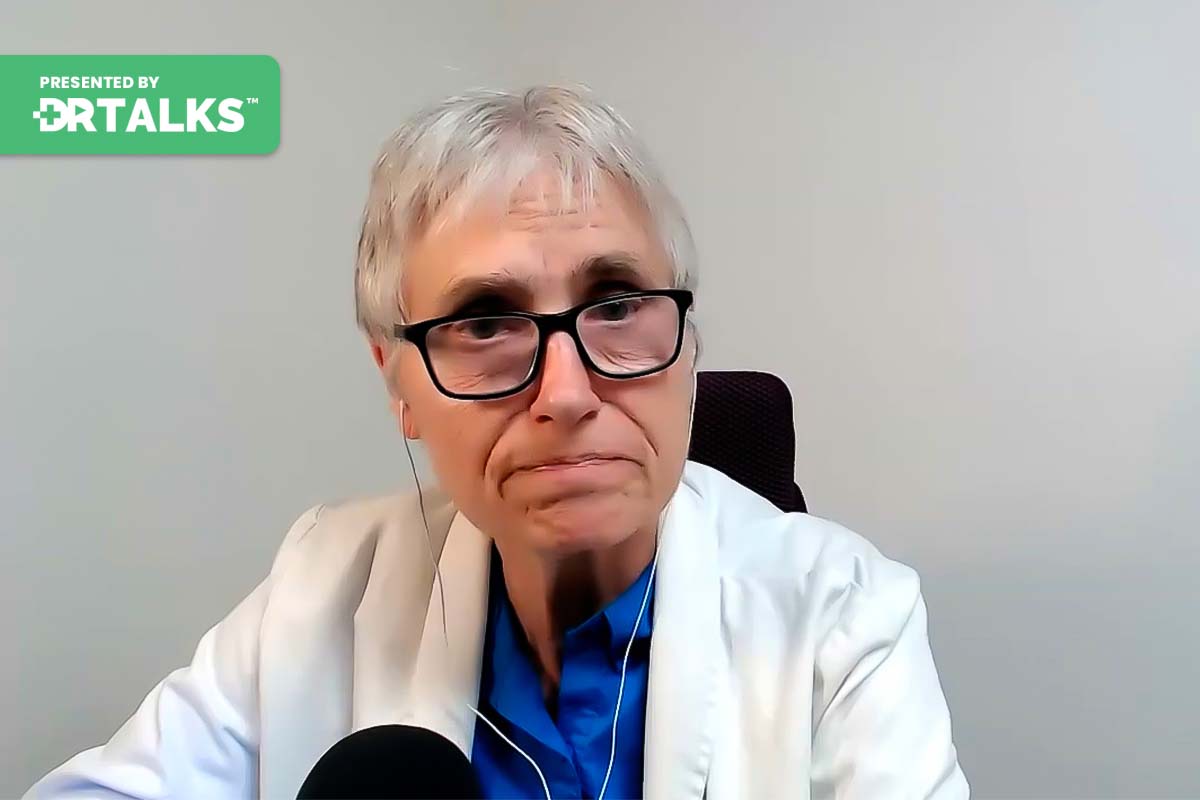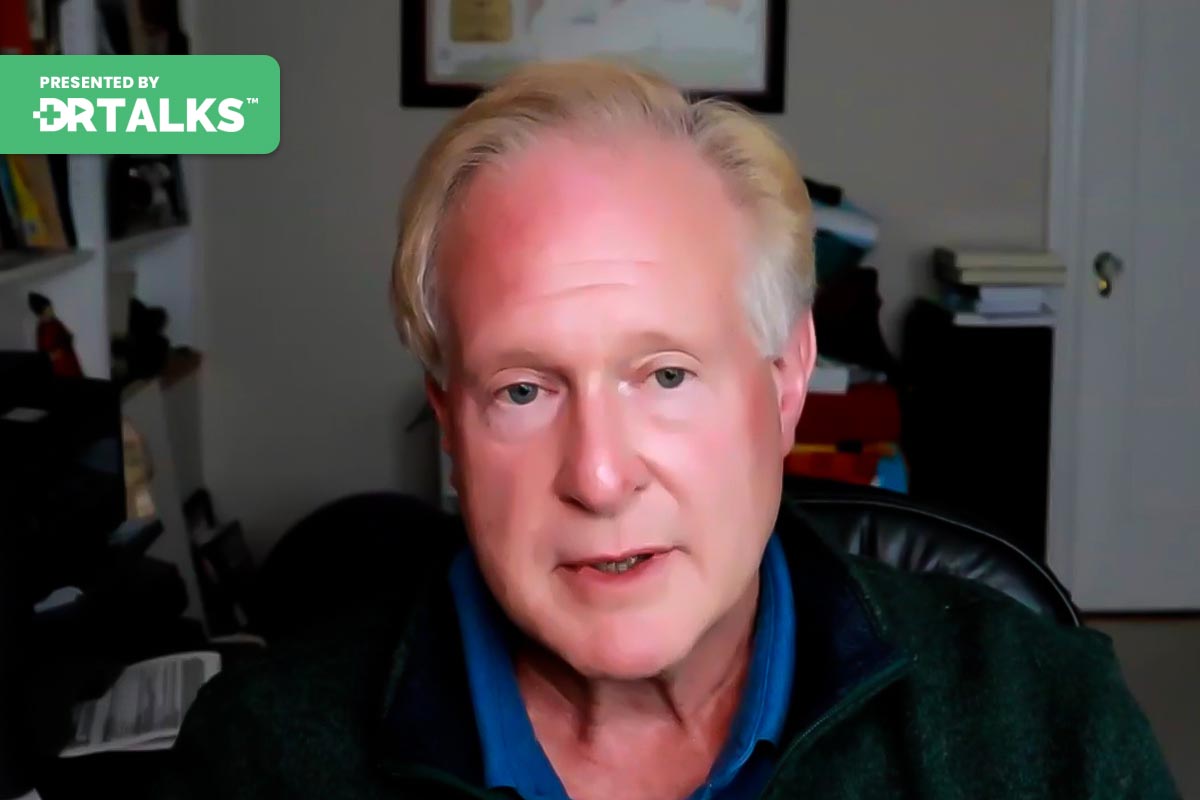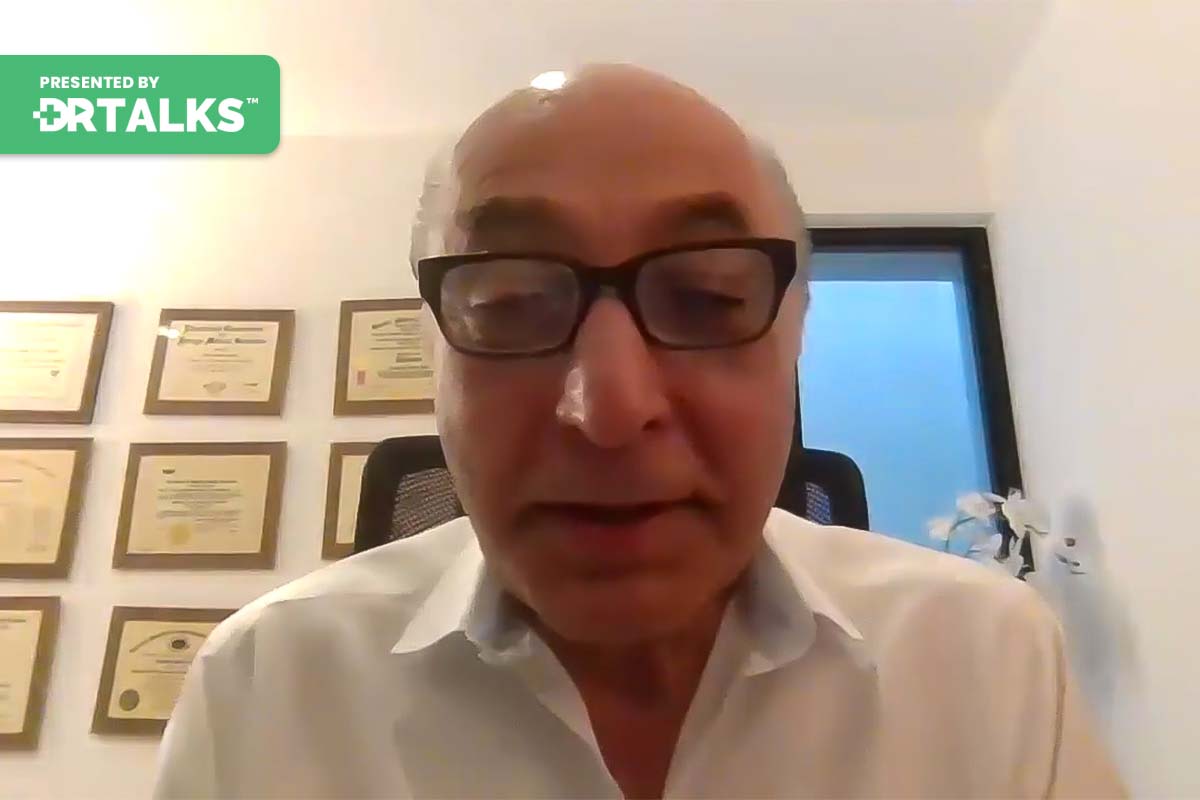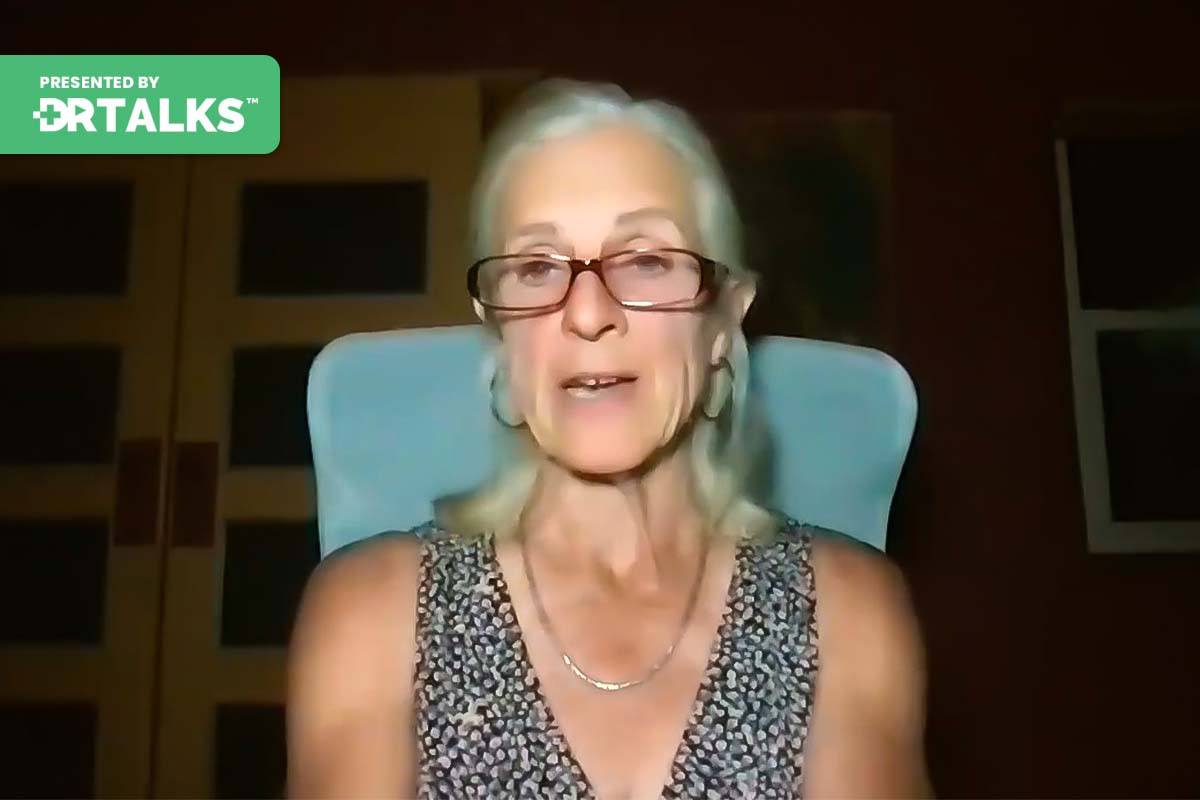Join the discussion below

Felice Gersh, MD is a multi-award winning physician with dual board certifications in OB-GYN and Integrative Medicine. She is the founder and director of the Integrative Medical Group of Irvine, a practice that provides comprehensive health care for women by combining the best evidence-based therapies from conventional, naturopathic, and holistic... Read More

Dr. Terry Wahls is an Institute for Functional Medicine Certified Practitioner and a board-certified internal medicine physician. She also conducts clinical trials testing the efficacy of diet and lifestyle in the setting of multiple sclerosis. In 2018 she was awarded the Institute for Functional Medicine’s Linus Pauling Award for her... Read More
- Discover the connection between autoimmune processes and PCOS, and explore diet strategies to enhance metabolic health
- Learn practical tips on how to modify your diet and reduce autoimmunity triggers by incorporating beneficial foods
- Gain insight into the importance of estrogen and the potential benefits of hormone replacement therapy for menopausal women
- This video is part of the PCOS SOS Summit
Related Topics
Autoantibodies, Autoimmune Disease, Autoimmunity, Calming Immune System, Circadian Rhythm Problems, Complex Chronic Diseases, Diet, Environmental Factors, Estrogen Production Problems, Estrogen Receptor Problems, Fatigue, Genetic Risk, Immune Cells, Impaired Gut Barrier, Leaky Gut, Lifestyle, Mitochondria Dysfunction, Neuroprotection, Pain, Paleo Diet, PCOS, Protocols, Recovery, Reverse Problem, SupplementsFelice Gersh, MD
Welcome to this episode of the PCOS SOS Summit. I’m your host, Dr. Felice Gersh. I’m here now with Dr. Terry Wahls, who is a pioneer in the research and development of the utilization of lifestyle to impact on auto immunity. She has written some amazing books and I couldn’t be happier to have her here because women with PCOS actually suffer higher rates of autoimmunity, particularly Hashimoto’s thyroiditis, than the average population of reproductive aged women. So welcome, Terry, and thank you so much for joining us. I was hoping you could tell us something about your own life journey. I know that you’ve talked openly about your avails and successes with your own diagnosis of multiple sclerosis. So just tell us about your own journey and how you got into the wonderful research you’re doing and some of the things that you’re actually involved in today.
Terry Wahls, MD
So we’ll sort of talk in real time. 23 years ago, walking with my wife Jack, a half mile from home, my left leg goes weak, dragging a hobble. I see the neurologist who says, Terry, this could be bad or really, really bad. And so we begin doing the testing for like three weeks. And as I go through that testing, I’m thinking about the 20 years of worsening electrical face pain that I already endured. I know I probably have a progressive disease. I don’t want to become disabled. So actually I’m praying secretly for a rapidly fatal diagnosis. Three weeks later, I get my spinal tap. The last test and the diagnosis is multiple sclerosis. And as I do my research, I find the very best M.S. center in the country, probably in the world.
I see the best physicians. I take the newest drugs. Three years later, I hear tilt, recline, wheelchair. My face pains have gotten relentlessly worse. My ten year old daughter hugs me as tears streamed down my face. And I ask myself, Am I really doing all that I can? I go to PubMed night after night. I read the latest science articles about M.S., Parkinson’s, Alzheimer’s, ALS, Huntington’s. I decide that mitochondria dysfunction are the driver of disability. I create a supplement cocktail for my mitochondria. It slows my decline. I’m very grateful. I discover a study using electrical stimulation of muscles. I convinced my physical therapist to let me have a test session. Hurts really quite bad, but when it’s over I feel great and we add electrical stimulation muscles to my physical therapy.
I discovered the Institute for Functional Medicine. I take the course on neuroprotection. I have a longer list of supplements which I had. Then I had a really big aha in place. I’m embarrassed now by how long it took me to have this. What if I redesign my paleo diet that I’ve been doing already for five years based on this long list of nutrients that I’m taking by supplement form? And I do my research, figure out where they are in the food supply. And so now I have a very structured paleo diet. I start this new way of eating at the end of December. Now, at that time, I’m so weak I cannot sit up in a regular chair. I’m in a zero gravity with my knees higher than my nose, or I’m in bed. I can take a few steps using two walking sticks, or I’m in my taut, reclined wheelchair. Fortunately, my mind is still clear, so I’m able to staff connect with present physicians. I’m on the Institutional Review Board reviewing research. But I’m beginning to have some brain fog. So I know I’m soon going to have to take medical disability and I start this new way of eating in just a month.
The brain fog is gone. The fatigue is definitely less. And my physical therapist says, Terry, you’re definitely stronger and advances exercises. I can now do 10 minutes of exercise twice a day. And we studied that. I began walking with walking sticks in the hallways of the hospital, first with two walk six, then with one and with none. And then on Mother’s Day. So we’re talking like six months later, we have an emergency family meeting because I want to try riding my bike. And Jackie tells my 16 year old boy, who’s six foot five. Zach, you jog alongside in the lift. She tells my 13 year old daughter, Zibby, you jog alongside on the right and she’ll follow. We get in position. She tells me to push off, and I bike around the block. And you know that big 16 year old boy. He’s crying. The 13 year old girl. She’s crying. Jackie’s crying. And when I tell that story, I to cry. Because, you see, it was at that moment that I understood the current understanding of secondary progressive multiple sclerosis is incomplete, and like, who knows how much recovery might be possible.
So I kept biking a little bit more every day in October, just a few months later. Jackie says, Let’s say you feel the courage, right? It’s 18.5 miles. However far you go will be a triumph. And once again, when I cross that finish line, my children are crying. Jackie’s crying. I’m crying. And it fundamentally changes how I think about disease and how it will change the way I practice medicine. And it will change the focus of the research that I do. And I’ve since made it my mission to teach other clinicians the protocols that I use for my recovery, the protocols that I use and my struggle research. And I teach the public how to use these protocols to address their complex chronic diseases.
Felice Gersh, MD
Well, it is a story for the ages. I mean, what you accomplished. And to think that you barely had any function left in your body to move to a Port itself.
Terry Wahls, MD
I was coming to terms with the fact that clearly, after, you know, 27 years of worsening neurological symptoms, I was clearly on track to become bedridden by my illness. I was being a brain fog. I could see it was on track to become demented, probably by my illness. And because of the trade journal Neurology was, which is this intense, horrific electrical face pain which turns on light sound triggers the pain, talking, swallowing, triggers of pain so that I knew the trajectory of that would be permanently on. And when that happened, you know, I would be unable to speak, unable to swallow, because when it turns on and you try to speak, it will be like this. Well, so I could start to get a syllable out. But the electrical pain comes so intense that you can’t get any more than just a so you become non-communicative. Non-communicative.
And you know, for my family, you know, having watched that, they knew how horrible those experiences were. And so in 2007, it’s like, okay, that was going to be how things would end for me that my face pain would turn on. I’d be non-communicative. I changed my medical power of attorney in my living will, such that if I get to the point where I could not swallow and I could not talk, there’d be no IV fluids. So I knew, know it might take ten days. 14 days at worst to die of dehydration. But the suffering would eventually end.
Felice Gersh, MD
Well, if if we didn’t all know and everybody know this is a true story. This would seem like a fantastical fairy tale ending. But let’s go back a little bit to the beginnings of like, I bet a lot of the people out there viewing this don’t know what is autoimmune disease. Let’s start at the very basics like the ABCs. So you Have One type of autoimmune disease and there are many types of autoimmune diseases, right? Like the fundamentals of like what is going on here.
Terry Wahls, MD
So there are 80 known types of autoimmunity and hundreds more that have autoimmune processes where the immune cells, instead of being able to recognize in my case, my myelin, my brain tissue as belonging to me, they think it belongs to something else and is a threat. And so they begin activating the immune cells to begin attacking and dissolving this damaged tissue, but they aren’t able to repair it properly so slowly over time. And it depends on your genetics and your microbiome, which tissues get attacked. And furthermore, if we don’t get to the root cause as to why that’s happening every 5 to 10 years, another organ system that’s going to get attacked so that, you know, most common autoimmune diagnoses are Hashimoto’s thyroiditis another very common autoimmune process is psoriasis which has a lot of autoimmune features, rheumatoid arthritis, inflammatory bowel disease, multiple sclerosis.
You know, there’s about a million people with our. Ms. but 3 million with our probably about 8 million with Hashimoto’s, about 8 million with psoriasis, but we have probably another 25 million that have some type of autoimmune disease. If we lumped them all together. And if you decide if I measure auto antibodies so antibodies that I can measure that are attacking some organ system or some tissue type, there are 50 million that have auto antibodies and they probably also have either pain or fatigue, which is why their physician said, well, let’s check the auto antibodies like, oh, they’re high, but not high enough to make a diagnosis. So why just keep doing what you’re doing and see me next year? Whereas if they were coming to see me, I’d say, Hmm, you have autoantibodies. So let’s address all these environmental factors and try and calm your immune system. So see if we can reverse the problem so you never get an autoimmune diagnosis.
Felice Gersh, MD
Well, you and I are entirely on the same page because I check RNA routinely and find it elevated. And when they see sometimes they’ll run off and see a rheumatologist because, you know, a friend or a family member. It says so. And then the rheumatologist says, Well, you don’t meet the criteria for an actual autoimmune disease. So like goodbye, you know.
Terry Wahls, MD
Come see me next year.
Felice Gersh, MD
So when I see my women with PCOS who like I said, they have high rates of Hashimoto’s, some of the things that I find when I evaluate them is that they have what is labeled, you know, impaired gut barrier or a leaky gut. They often have circadian rhythm problems where they often have like flipped circadian rhythm, where their cortisol is high at night and low in the morning, and they have estrogen receptor problems. They also have estrogen production problems. And so, you know, how does that these issues that affect women with PCOS, how does that link into the general etiology of the condition?
Terry Wahls, MD
So let’s go back. Many of us will have the genetics that increase the risk of developing some autoimmune issues. So that’s do I have the genes that put me at risk? Then the next thing happens, do I have a viral or bacterial infection? The most common one people maybe have heard about is Epstein-Barr virus. In 95% of us will have that infection and there are 15 other microbes that increase the risk of autoimmunity. So the reality is, anyone who’s listening to this, you probably have a gene that increases your risk and you’ve probably had more of the microbes that increase your risk. And then the question is, the next thing that can ramp up the risk is a leaky gut. And what drives a leaky gut? A big factor is a diet, very high in carbs, a lot of added sugars, a lot of processed foods, a lot of alcohol, aspirin, acid blocking medication.
All of those things make it more likely that the intestinal barriers are opened up and the proteins that have not been fully digested and some bacteria fragments get into your bloodstream and your immune cells will know that those fragments are too big. They shouldn’t be there. If we digest a protein all the way down to amino acids, not a problem if we don’t have any bacteria fragments in our bloodstream, not a problem. But if you have that leaky gut, the bacteria fragments really irritate the immune system. The innate immune system’s very active. If you have these incompletely digested proteins, gluten, being proud, most common casein gluten is a protein grain, casein is a protein and dairy and they’re structurally they similar amino acid sequences, those two proteins. If you develop a food sensitivity to those, that is the first step in the sequence that can lead to Hashimoto’s, that can lead to rheumatoid arthritis, that can lead to psoriasis, that can lead to inflammatory bowel disease, that can lead to M.S..
So an early step that all the listeners can take is look at my diet by eating a lot of added sugar. I could cut that down. I could reduce the simple carbs, reduce the flour based products that are so tasty and so cheap. You know, the breads, the pastas, the cereals that over feeds, the harmful candida yeast. In your gut, it increases the probability of a leaky gut. So that’s an easy step. Then in my clinical practice, I may go a little bit further and put someone on a grain free diet, I may put them on a gluten free diet. I may investigate this a bit further. But for your listeners, a first step that would be super helpful. Eliminate the alcohol, eliminate the insides, eliminate added sugars, and greatly reduce the flour based products.
Felice Gersh, MD
Well, that sounds like universal advice. Right.
Terry Wahls, MD
And another good advice for everyone.
Felice Gersh, MD
And that would be for women who have not even been diagnosed right. This week. You don’t have to wait to be diagnosed. We’re like proactive. Right.
Terry Wahls, MD
You know, we have a lot of evidence now that there’s a protocol for years, maybe 5 to 10 years of cognitive decline, this pre problem for Alzheimer’s and there is a list of cognitive decline and some motor stiffness as a problem for Parkinson’s. And we now know likewise there’s a 5 to 10 year program for autoimmune 80 for rheumatoid arthritis, inflammatory bowel disease, our mouse and this is in that program when you’re having pain fatigue, anxiety, depression, skin rashes, migraines, those are part of the protocol that I’m betting many of the women listening to PCOS will say, well, that’s me, you know, and period problems, by the way, infertility are part of that protocol. So like we, the people who are listening to this, many people would say that PCOS is part of that protocol in that we could if we could get you into Felicia’s clinic or into my clinic and we could tune up your diet and self-care routine, we could we restore more appropriate hormonal balance, more appropriate microbiome, more appropriate immune function, and that positive RNA would disappear. And that’s where that circadian rhythm imbalance would disappear, that the cortisol peak would go back to the right time of day, that these are the kinds of things that diet, lifestyle, self-care can have a huge impact. And, you know, we can do functional medicine testing to monitor that and give you some guidance and feedback on your self-care routine. Absolutely.
Felice Gersh, MD
This is so critical because we know that the conventional medical approach is reactive. Unlike like we mentioned, we are proactive and that’s really not recognized in the general medical community that you can actually both prevent and reverse autoimmunity like a and like with the thyroid. So I measure routinely thyroid antibodies, which is not the typical standard approach. And so often in women who have yet to develop hypothyroidism but yet they have like the pro-drug, they have the antibodies present. And I have found that you can reverse it. And this is amazing and not not accepted widely that you can reverse it. It’s not a doomsday diagnosis. I mean, you’re living proof of that. Oh, absolutely many are. And so do you agree in terms of testing like that, you should be doing these proactive antibody tests?
Terry Wahls, MD
Well, what I think we need to do is realize that people are in this protocol phase. And when someone comes to you with these proton symptoms, anxiety, depression, migraines, period problems, I would think about this with PCOS, with pelvic pain, infertility, skin rashes, pain that’s been poorly controlled, that’s a pro role. And you can think of this as sort of metabolic chaos, dysfunctional hormone dysfunctional immune system. I investigate those folks. We talk about their modifiable lifestyle factors. We talk about diet, sleep, stress, exercise, social connectedness. And then I have a big conversation about the problems that I see and things that could be improved. And part of my discussion is in what domain would you like to start working first in while I can give them a list for Here’s the diet, here’s the exercise, here’s a stress reaction, all of these things, it’s pretty hard to upend your life so completely.
People are generally more successful if they get to pick where they want to start and they also get to pick like, do they need just a little next step or are they ready for a really big next step? Because I want them to be successful. And so it’s sort of a big conversation. We also talk about how much testing can they afford? Do we want to do this on the basis of history in a careful clinical exam? And then we’re going to work on the modifiable lifestyle factors at the pace that they could manage. And I have some folks who have a lot more economic resources, a lot more bandwidth and preps, more pain points. So they’re like, okay, I want to measure everything and you tell me the most, I’m ready to do everything because my life is so miserable and have other folks who need to come at this in a more incremental basis.
Felice Gersh, MD
Well, I agree, because as we know, in the functional medicine world, there are so many lab tests that are very interesting and add definitely a lot of data, but can also add enormous cost. Yeah. So, you know, right, you have to pick and choose your battles and what you’re going to do. That’s why I generally start with the lab tests that are usually covered by insurance that we can use more disposable cash for therapeutics rather than just diagnostics.
Terry Wahls, MD
And one of the things that when I was first learning how to do functional medicine that transformed my health, I was in the Veteran Affairs medical system. Well, I could do no functional medicine tested. I could do no fancy supplements, I could do a patient exam, I could do lipid glucose, insulin, B-12 and homocysteine, highly sensitive therapy that was at very basic labs. And I got stunning results. You by addressing those basic labs and diet and lifestyle at the pace people people and their families were willing to do it. People would come with complicated medical problems. 20 to 30 prescription drugs, severe pain fatigue with a wide variety of autoimmune issues, a wide variety of psychiatric issues, a wide variety of hormonal problems. And, you know, the blood pressures are improving. Their blood sugars are improving, their pains reducing. And I’m having to watch them closely because we’re having to keep cutting back their their meds, their doses, and we’re limiting meds that I’m meeting with the chief of medicine, the chief of specialty medicine. Then I have to start meeting with the chief of the hospital, the chief of staff, the chief nurse, because we’re having so much success and I’m having to reimagine how I’m doing this because there are so many people wanting to come to my clinic now. So we start with small groups, the larger groups, then classes, then larger classes, you know, and that’s actually how I got started running my programs where I would teach this to hundreds of people at a time.
Felice Gersh, MD
That is great because there are millions that need to hear the.
Terry Wahls, MD
Millions that need to hear this.
Felice Gersh, MD
Absolutely great. And what I love is how you link the issues of autoimmunity to basically all of metabolic functionality in the body, that it’s not an isolated thing. It’s like linked to. I mean, you talked about all these symptoms that are both neurological, gastrointestinal, emotional like, you know, everything is linked together and autoimmunity is not an isolated problem. And when you improve the diet and you clean up the gut and you help heal, you help all these symptoms, it’s not just one thing. And that’s such a problem in our health care system, is that it looks at systems as if they’re isolated and disease. States are just labels instead of processes. And so I just applaud you for that. And you did mention it like the immune system. So autoimmunity has the word immune in it. So one of the things that is interesting with women with PCOS is that they tend to have lower levels of what are called T regulated lymphocytes. And I thought that would be something interesting for you to talk because you’re such an expert in this, you know.
Terry Wahls, MD
So the immune cells of T lymphocytes there is the effector cells in their regulatory cells. So we need to have them in balance effector cells help us protect us against acquired infections. It helps with our antibody formation, the T regulatory cells help calm the immune system and help develop tolerance for self. So in my case, I have an autoimmune problem affecting my brain, my myelin. And so in the world of mouse, we have not enough t regulatory cells and we know that my proportion of t regulatory cells into factor cells is highly regulated in the based on what we are eating. And everyone, again, who’s listening to this, I want you to know that 70% of your immune cells are lining your gut because the food that I eat, I have to digest, break down into small, small, smaller, smaller molecules.
Then it will have to go through the barrier between the inside of my bowels, very small intestine cross over into my bloodstream and my immune cells have to inspect. Every one of those molecules decide that’s an okay molecule, it’s good. Or it is. Is that molecule representing a pathogen, a microbe, a foreign compound that’s toxic to me. So there’s this continuous inspection. We know that if we have more resistant starch, more carbohydrates, that we cannot break down. And so they’re going to pass through the small intestine, into the larger intestine. My immune. So bacteria will metabolize it further and that increases my t regulatory cells. If I have more yogurts in Kiefer’s of it, I’m very insensitive to dairy, but I do yogurt in Kiefer’s made out of coconut milk and nutmeg and those fermented yogurts and kefir stimulate the t regulatory cells, sauerkraut and kimchi which are fermented cabbage products.
The kimchi has more ginger, garlic and hot peppers it so it’s got a little more as in our household as you would say a lot more zip to it. Sauerkraut, which is more in Europe is a milder does not have quite as much sip but both these products again stimulate the T regulatory cells and are so good for you and improving our territory. T cells is a fundamental goal for people with multiple sclerosis in nerve immune conditions and I predict it would be very, very helpful for people with PCOS and people with infertility, people with pelvic pain, endometriosis.
Felice Gersh, MD
Wow. And yes, this is such important information because this is such a prevalent problem. And of course, most people don’t even know what T cells are. And now they know because this is so relevant to women of all sorts, but particularly women with PCOS and talking about women, you know, I’ve heard that 80% of autoimmunity is in women. And is there a special reason that you think that’s how.
Terry Wahls, MD
Well estrogen does have an effect on immune system and of course, women, because we’re the ones who get pregnant and carry the fetus in our uterus. And we have to have a tolerance. Our immune system has to be modulated during that pregnancy. State so that we can tolerate this for an entity that’s living inside of us. We know that that estrogen effect, the progesterone effect, has a big impact on our immune system. We also know that women with arms in autoimmunity have higher rates of early menopause, premature menopause, premature ovarian failure. And if we do that accelerates our autoimmune disease. And we also know that when we hit menopause, so if you’re estrogen falls early, your disease accelerates and it’s more likely to fall early if you have an autoimmune disease. And then even if it falls at the usual menopausal time in your fifties, when the estrogen falls, that accelerates whatever autoimmune disease you have, you switch from the episodes of flares, remissions, whether it’s with rheumatoid arthritis, systemic lupus, inflammatory bowel disease or M.S. You go from flares to quiet to relentless smoldering decline due to your autoimmune problem and your cognitive function declines. So hormones are vitally important for immune function and vital important for our brain.
Felice Gersh, MD
Well, that is such critical information that you just gave out that I’m, you know, speaking about all the time, that estradiol is not just about making a baby. It’s very important for that, that’s for sure. But it supports all the sites in the body and including, of course, the immune system. And that women, when they don’t have proper balance and proper production of estradiol as occurs in women with PCOS, they’re more prone to so many problems, metabolic dysfunctions and so on, including problems with their immune system. But you bring it home in such, you know, with such beautiful eloquence that it’s about everything. And when you start bringing in brain function, I think that weakens everyone because nobody wants to suffer cognitive decline. Of course, no one wants to suffer anything. But that is like the most fearful thing of all. And in terms of like if you had one particular type of food, is there one thing we talked about the things to avoid and also about the fermented foods. But if you look in the plant based world, is there any type of plant or animal or just like what is like among the top notch foods that can help restore gut health and immune function?
Terry Wahls, MD
So what I’m looking for are more non starchy vegetables. So like the cabbage family vegetables, the onion family, mushroom family, super helpful green leafy vegetables, kale, collards, spinach, Swiss chard, dandelion greens and all of the green herbs and then protein. I want to be sure that there is sufficient protein now my preference is to have people consume meat, fish, poultry. But if you are opposed to that on your philosophical religious beliefs and you want to be a vegetarian or vegan, then it’s a legume plus a gluten free grain. We need to have the essential fatty acids omega three, omega six fats, omega threes in wild fish, grass fed meats and omega six are from nuts and seeds. The standard American diet has about 250 grams of carbs per day, way too many.
The Paleo diet level one my diet would have about 100 grams of carbs. And then we, depending on the person’s conditions, I may restrict that further put them on more of a ketogenic diet. Again, that depends on the person’s conditions, and I may put them on more of an elimination diet or do food sensitivity testing to identify. Are there other foods? Because if you’ve had a leaky gut for a long time and your incompletely digested food proteins have been crossing over into your bloodstream, you may have developed food sensitivity towards other foods such as citrus or shellfish or beef or pork. And so again, there are circumstances where food sensitivity tests can be very helpful.
Felice Gersh, MD
Yeah. And the tests, like you said, elimination, diet, the test of life, you know what?
Terry Wahls, MD
Also the test of what is good. So in my VA clinic, you know, I could never do food sensitivity testing. So we did the elimination diet and that was very effective. We could use the elimination diet, take out all grains, all legumes, nitrates for six months, and then reintroduce foods that were missed one item at a time to get to the least restrictive diet possible. And for most people, I could get them back to a diet where the only things that they had to keep out were gluten and dairy.
Felice Gersh, MD
Wow. That is phenomenal for diseases and conditions that are deemed incurable. And you’re you’re doing this and we’re doing it.
Terry Wahls, MD
We’re doing very well. You know, we had such success that the VA national office came out to see what we were doing. They incorporated many of the concepts that we used into their clinics called the Whole Health Clinic, and it’s been very helpful for them. So I’m very glad for them.
Felice Gersh, MD
I’m glad that they had you on board. You know, this is like revolutionary really in the world of medicine to reverse conditions that have always been deemed, you know, yeah, it’s phenomenal.
Terry Wahls, MD
And my message, my message in 2009 was so controversial, I was banned as a speaker because my ideas were dangerous. I but I kept going and speaking where I was invited, writing my books, doing my research, getting our papers published, which have been cited now over 1500 times. And, you know, I was recently at the Consortium of Multiple Sclerosis Centers. Again presenting her research, and now I’m being heralded as a brilliant visionary. One of the great grandmothers who led the way on the importance of diet and lifestyle and wellness programs for people with multiple sclerosis.
Felice Gersh, MD
It is well-deserved. You are definitely at the pinnacle of research in this field and we’re all so grateful for you. I remember reading your book, your first one, and thinking, Wow, I never heard about this in medical school. None of us could read. Then they were anti you know, you had to fight all the ridiculous prejudice against these what seemed like revolutionary ideas. And now they’re, of course, accepted that diet actually matters, although we still hear that, you know, like, oh, it doesn’t matter what you eat. Of course it matters what you eat along with all the other, you know, issues that involve lifestyle. I am sure that everyone out there watching this is saying, but I need to learn more. I need like, yes, how do I get started and how can I access more information this and how can I reach out and learn more from the famous Dr. Wahls. So maybe you could tell us where they can find you and how to get more information on all of these critically important topics.
Terry Wahls, MD
Well, the first thing, if you happen to have multiple sclerosis, come be part of my clinical trial. So go to terrywahlsmd.com, terrywahlsmd.com/MSstudy and see if we’re still recruiting follow me on Instagram: drterrywahls, D R TE R R Y W A H L S. You get to see what I’m eating doing and that’s lots of fun. And if just go to my website, terrywahlsmd.com, we have all sorts of resources there to get you started.
Felice Gersh, MD
Wow. I think people can be quite busy and learn a ton just from what you just gave them. And wouldn’t it be amazing if some actually became part of your studies? That’s yeah.
Terry Wahls, MD
That’s why I do all these summits so I can help recruit from it for, you know, because we’re trying to get 156 people into my study. We’ve gotten, I think, 88 and we’re making great progress. We have room for about 70 more. And if so, if you’re listening to this study or this summit and you have M.S. or, you know, someone who has M.S., send them over to our website terrywahlsmd.com/MSstudy and see if you can enroll.
Felice Gersh, MD
Well, that is such an opportunity that no one should miss it if they can actually contribute both for their own health and also for the future health of how many people out there with MS, you know, like you said, it’s a million and growing. So that is great. And also just whatever autoimmune condition or autoimmunity or the symptoms that you describe that can be precursors to developing autoimmune diseases, everyone should access the information that you’ve put out there and made so amazingly available to everyone to to get in learn from. So I can’t thank you enough for joining me on my summit. It’s been a fantastic episode. Thank you so, so much.
Terry Wahls, MD
Thank you.
Downloads










